
 Flash News
Flash News
Ceno Klosi with over 800 stolen votes, Balluku finds the reason is the tiredness of the counters
"Fast & Furious" in the former Block, police chase an Audi Q8, 4 cars collide
Car hits two tourists on a motorcycle in Fushe Arrëz, one of them dies
Serious accident in Thumanë, one dead, 3 injured
Durrës Court suspends the director of Pre-University Education from duty
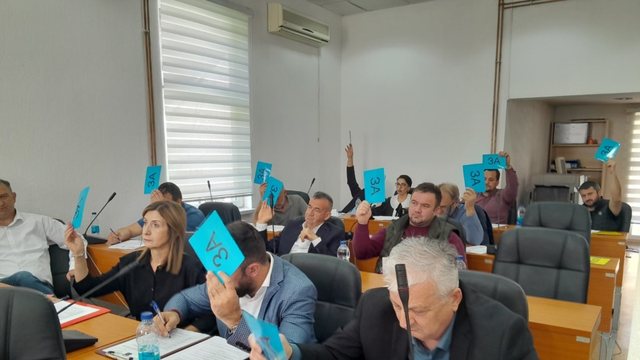
Serb members of the Srebrenica Municipal Council have voted to rename many of the city's streets to honor the Serb victims of the war, while ignoring the massacre of 8,000 Bosniak men and boys in 1995.
Despite international demands to reconsider the plan and after a boycott by Bosniak members of the council, the proposal to rename 25 streets in Srebrenica and the neighboring village of Skelani was approved on April 15.
This decision has been described by critics as another attempt to erase the history of the greatest atrocity in Europe since the Second World War.
According to the plan, a square and part of a street have been renamed "Republika Srpska", in honor of the name of the Serbian entity of Bosnia and Herzegovina. Another street will be renamed after a controversial Serbian commander from the First World War.
The July 1995 massacre, which was carried out by Bosnian Serb forces, has been declared genocide by the former International Criminal Tribunal for the former Yugoslavia and the International Court of Justice.
So far, more than 50 people have been sentenced to over 700 years in prison for genocide and other crimes in Srebrenica.
Radovan Karadzic, the first president of the Republika Srpska [1992/1995], the predominantly Serb entity that together with the Bosnian and Croat federations make up Bosnia, was sentenced to life in prison for genocide and other crimes, including at Srebrenica.
The Republika Srpska army commander at the time, Ratlko Mlladić, is serving a life sentence for genocide as well.
The controversial proposal was approved despite the Organization for Security and Co-operation in Europe (OSCE) calling for a "transparent and comprehensive solution" to the naming of streets in Srebrenica.
Last month, the OSCE mission in Bosnia and Herzegovina welcomed the Streets for Peace Project, an initiative by the city's youth to rename streets using inclusive and neutral names, such as "Street of the Future", "Street of Tolerance" and "Children of Srebrenica".
The decision comes ahead of a UN General Assembly debate on April 17, where a UN resolution to declare July 11 as the International Day of Remembrance of the 1995 Srebrenica Genocide will be discussed, which it is expected to be voted on May 2.
The resolution is partly similar to the resolution on the Rwandan genocide, where around 800,000 Tutsis and Hutus were killed. Its draft was developed by a group of countries, including Rwanda, Germany, France and the United States.
The resolution was opposed by Milorad Dodik, the pro-Russian leader of the Republika Srpska, who threatened that, if the resolution is approved, "the Republika Srpska will withdraw from the decision-making process in Bosnia."
Under the new plan, Srebrenica City Park will be renamed "Kosta Todorovic Park", in honor of the Chetnik commander from World War I.
The Chetniks were Serbian paramilitary and transnationalist groups who first fought against the Ottoman Empire during the Balkan Wars of 1912 and 1913, as well as during the First World War.
During World War II, Chetnik forces committed war crimes in Bosnia, including mass killings and executions.
Some Serbian paramilitary and military formations called themselves Chetniks even during the wars in Bosnia, Croatia and Kosovo in the 90s./ REL
Latest news





Lufta në Gaza/ Pse Netanyahu do vetëm një armëpushim 60-ditor, jo të përhershëm?
2025-07-02 21:56:08
US suspends some military aid to Ukraine
2025-07-02 21:40:55



Methadone shortage, users return to heroin: We steal to buy it
2025-07-02 20:57:35
Government enters oil market, Rama: New price for consumers
2025-07-02 20:43:30
WHO calls for 50% price hike for tobacco, alcohol and sugary drinks
2025-07-02 20:41:53







Israel agrees to 60-day ceasefire in Gaza, but many unanswered questions remain
2025-07-02 18:35:27
The weather in Germany is going "crazy", temperatures reach 40°C
2025-07-02 18:22:21

"Fast & Furious" in the former Block, police chase an Audi Q8, 4 cars collide
2025-07-02 17:59:25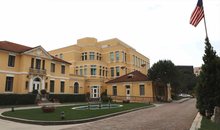
"Birth on a tourist visa? US Embassy warns Albanians: This is prohibited!"
2025-07-02 17:48:16


BIRN: Fier recount reveals vote trafficking within open political party lists
2025-07-02 16:57:19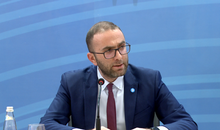

CEO and former director of 'Bankers Petroleum' arrested in Fier
2025-07-02 16:40:42
Car hits two tourists on a motorcycle in Fushe Arrëz, one of them dies
2025-07-02 16:33:23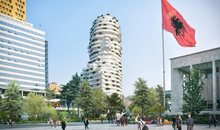


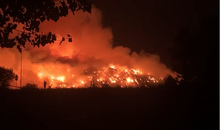
Fire at the Elbasan Incinerator Landfill, Prosecution Launches Investigations
2025-07-02 15:34:54
What you need to know if you travel to a country with active volcanoes
2025-07-02 15:33:03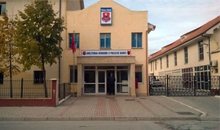
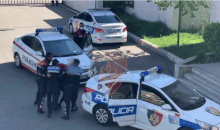


EU proposes 90% reduction in greenhouse gases by 2040
2025-07-02 14:50:23
Europe is burning from the heat / Italy and France are on maximum alert
2025-07-02 14:36:52

Moscow's contradictory statements: Is the friendship with Vučić breaking down?
2025-07-02 14:21:05
'I lost my battle': Sea warming is killing fishing in Albania
2025-07-02 14:08:35
Sekretet kimike që ndihmojnë në mbajtjen e mjaltit të freskët për kaq gjatë
2025-07-02 14:01:26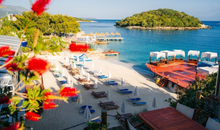
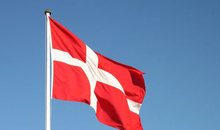
Denmark makes historic decision to make military service mandatory for women
2025-07-02 13:44:33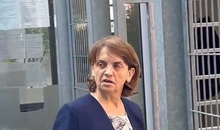
The appeal of the GJKKO leaves former judge Pajtime Fetahu in prison
2025-07-02 13:30:20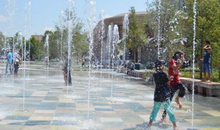
Productivity losses could reduce GDP by 1.3% as a result of extreme heat
2025-07-02 13:21:04
He abused his minor daughter, Zamir Meta is left in prison
2025-07-02 13:04:04

Waste burning in Elbasan, Alizoti: They are poisoning people and stealing money
2025-07-02 12:48:39
Civil disobedience continues in Serbia, dozens of people detained
2025-07-02 12:40:32
Rama's government was born under the sign of garbage and will end like this
2025-07-02 12:28:09
Water prices increase in the municipalities of the Elbasan region
2025-07-02 12:13:38
Civil disobedience continues in Serbia, what is happening in Belgrade?
2025-07-02 12:07:44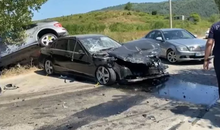
Serious accident in Thumanë, one dead, 3 injured
2025-07-02 11:54:42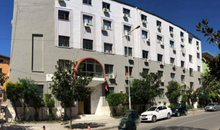
Durrës Court suspends the director of Pre-University Education from duty
2025-07-02 11:49:27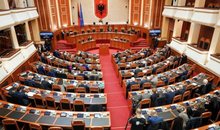
Plenary session on Thursday, what is expected to be discussed
2025-07-02 11:36:43
Europe is burning from heat waves/ What is the 'thermal dome' phenomenon?
2025-07-02 11:26:25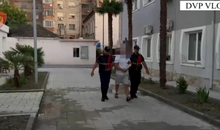
Wanted by Italy for murder, 45-year-old arrested in Vlora
2025-07-02 11:19:31
Fire situation, 28 fires reported in 24 hours, 2 still active
2025-07-02 11:13:20
"Buka" file, preliminary hearing for Ahmetaj postponed to July 17
2025-07-02 11:03:30
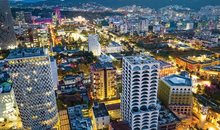

Baçi: Belinda Balluku and Ceno Klosi, the most dangerous "gangs" in Fier
2025-07-02 10:32:09
Zamir Meta, suspected of sexually abusing his daughter, arrives in court
2025-07-02 10:21:33

Trump: Israel has agreed to a 60-day ceasefire in Gaza
2025-07-02 10:01:55
Fire continues at Elbasan landfill
2025-07-02 09:51:13

Dates to note during July, important events will occur
2025-07-02 09:31:45
The hearing for Jorgo Goro's claim is postponed
2025-07-02 09:24:19



Foreign exchange, the rate at which foreign currencies are sold and bought
2025-07-02 08:42:31

52% of pensioners did not receive full pension in 2024
2025-07-02 08:27:18
Horoscope, what do the stars have in store for you today?
2025-07-02 08:13:36
Hot weather, Wednesday brings high temperatures
2025-07-02 07:59:16
Morning Post/ In 2 lines: What mattered yesterday in Albania
2025-07-02 07:46:15
Heatwave sweeps across Europe, Spain and England record hottest June ever
2025-07-01 22:57:41






Golem and Qerret without water at the peak of the tourist season
2025-07-01 21:09:32

Euractiv: Italy-Albania migrant deal faces biggest legal challenge yet
2025-07-01 20:53:38
BIRN: Brataj and Fevziu victims of a 'deepfake' on Facebook
2025-07-01 20:44:00

Vlora by-pass, work delays and cost increases
2025-07-01 20:24:29



Milan are expected to give up on the transfer of Granit Xhaka
2025-07-01 19:41:25

